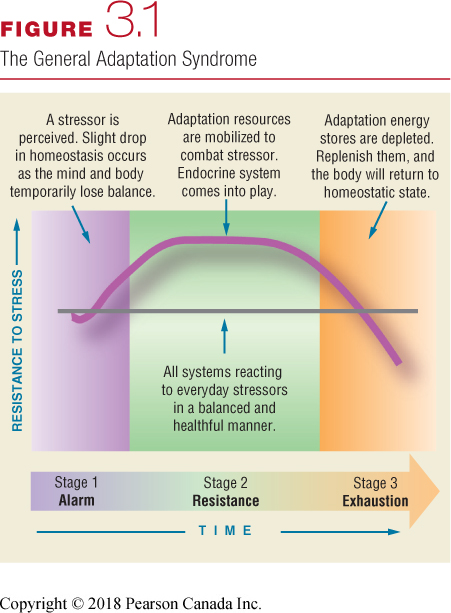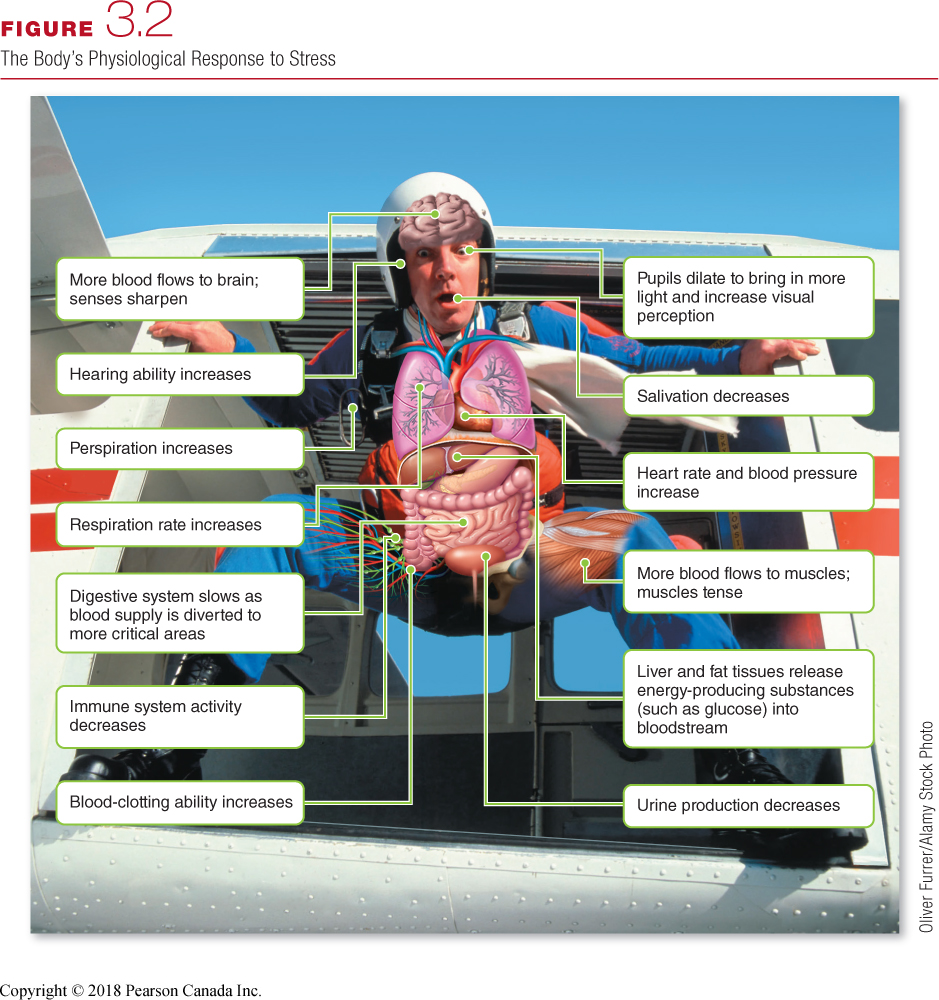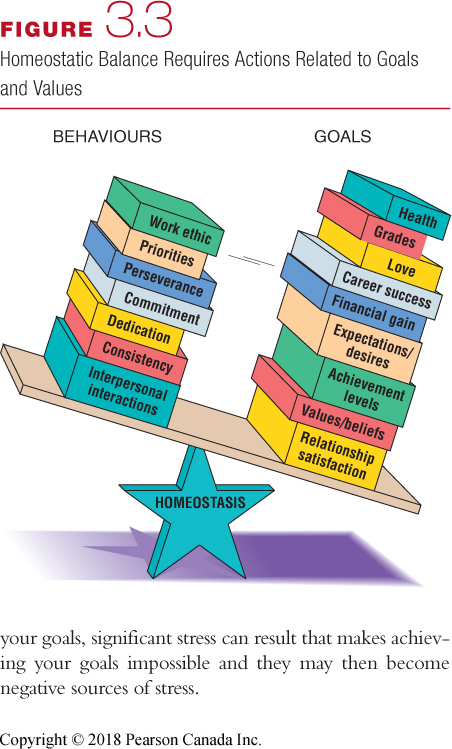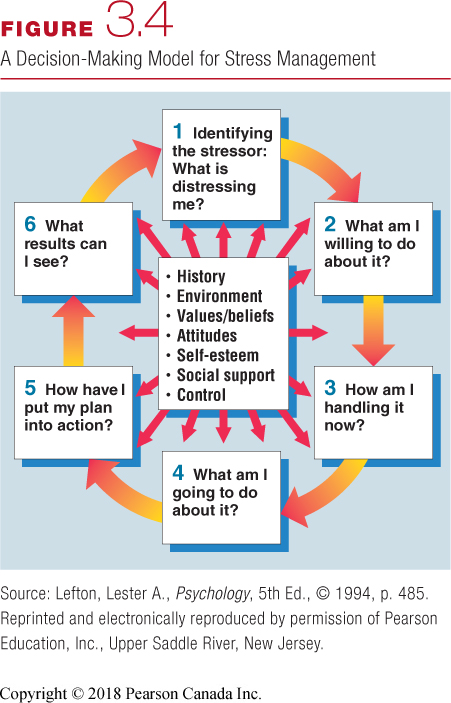Understanding and Coping with Life’s Stressors
1/33
There's no tags or description
Looks like no tags are added yet.
Name | Mastery | Learn | Test | Matching | Spaced |
|---|
No study sessions yet.
34 Terms
Define stress, stressors, and stress reaction
Explain the three phases of the general adaptation syndrome (GAS) and describe what happens physiologically and psychologically when under stress
Discuss psychosocial, environmental, and self-imposed sources of stress. Describe the stressors particularly relevant to university and college students
Identify stress management techniques
Clarify the immune system’s response to acute and chronic stress
stress - 2 definitions and who made the 2nd one?
an externally imposed factor that threatens or makes a demand on our minds and bodies
Hans Selye’s definition of stress is “the physiological and psychological responses to the demands placed upon us.”
stressor
any physical, social, or mental event or condition that forces the body to react or adjust
adjustment
an attempt to cope with a given situation
strain
the wear and tear our bodies and minds sustain as we adjust to or resist a stressor
what are the 2 types of stress?
Eustress—stress that results from generally positive situations.
Distress—negative stress.
both types of stress provide you with an opportunity for personal growth and can lead to personal satisfaction
psychoneuroimmunology - what is it, what does it examine (2) and what is the hypothesis
study of the effects of stress on disease
attempts to analyze the relationship between the mind’s response to stress and the ability of the immune system to function effectively
examines the beneficial role of enhancing physiological functioning and better management of stress and the stress response
focused on the hypothesis that during periods of prolonged stress, elevated levels of adrenal hormones destroy or reduce the ability of white blood cells thus, the body is less effective at combating illnesses
what is the body’s physical response to stress?
complex intricacies of physical and emotional reactions to it cause the body to wear down over time
stress → “disease of prolonged arousal” that often leads to other negative health effects
general adaptation syndrome (GAS)
3-stage response to stress → when a stress is perceived, the mind and body adjust with an adaptive response to restore homeostasis
what are the 3 stages of GAS?
Alarm
occurs when homeostasis is disrupted and the body prepares for “fight or flight.”
Resistance
begins almost immediately after alarm phase starts
body adjusts in order to return to homeostasis
parasympathetic nervous system helps get stress hormones under control
Exhaustion
occurs after continuous alarm and resistance reactions
adaptation energy stores are foundations to help us cope with stress
when adaptation stores are depleted, burnout and serious illness may result

what part of the brain is a stressor interpreted by and what does it trigger? what determines the overall reaction to stress?
cerebral cortex
ANS (automatic nervous system)
sympathetic → preps body for fight or flight
parasympathetic → slows down body after stress reaction
hypothalamus
where does epinephrine come from and what does it do
secreted by adrenal glands in response to stress
strengthens heartbeat
dilates the alveoli
increases oxygen intake and breathing rate
stimulates the liver to release more glucose
dilates pupils
causes blood to be moved away from the digestive system
dries nasal and salivary tissues, producing dry mouth

what does ATCH (Adrenocorticotropic hormone) do
signals adrenals to release cortisol to make nutrients more readily available to meet energy demands
what are 7 psychological sources of stress
change → always produces stress. The more changes, the greater your stress response may be
hassles → petty annoyances, irritations, and frustration
pressure → occurs when we feel forced to speed up, slow down, intensify, or shift behaviour to meet goals
inconsistency between goals and behaviours → refer to image
conflict → when you are forced to make difficult decisions concerning two or more competing motives
overload → when you suffer from excessive pressure or expectations from those around you
burnout → a state of mental and physical exhaustion caused by excessive and continuous stress
also: problems with adaptation, frustration, overcrowding, discrimination (race, religion, social status, etc.), unemployment, poverty, etc

The Social Readjustment Rating Scale (SRSS)
predicts stress overload and the likelihood of illness
what are the 3 main types of stress?
psychosocial
environmental
self-imposed
environmental stress
comes from our physical environment and includes:
natural disasters
industrial disasters
background distressors such as noise, air, and water pollution
self-imposed stress
Self-concept is a component of stress
The cognitive stress system governs our response to stressors
Self-esteem is closely related to past stressful experiences
what did Freidman and Rosenman identify?
personality types and hardiness contribute to the kind and degree of self-imposed stress one experiences
Type A is hard-driven, competitive, anxious, time-driven, impatient, angry, and perfectionistic.
Type B is relaxed and non-competitive.
Type C personalities appear to succeed more often than Type B and have good health while displaying Type A patterns.
Psychological hardiness is characterized by control, commitment, challenge, choices and connectedness (sometimes called the Type C personality). Another “C” that fits this profile refers to courage.
stress management
consists primarily of finding balance or rhythm in one’s lif
what are the steps to dealing w/ stress?
identifying the stressor →assess whether you can alter the circumstances or if you must change your behaviours and reactions to the stressor
Recognizing and changing your responses →requires self-reflection, practice, and emotional control, cognitive coping strategies can be effective - downshifting
what am i willing to do abt it?
how am i currently handling it?
what am i going to do abt it?
have i put my plan into action?
what results can i see?

downshifting
a fundamental alteration in values and honest introspection about what is important in life
how can you manage your emotional responses?
Examine your emotional response and differentiate between normal emotions and those based on irrational beliefs
Examine your self-talk and accept responsibility where appropriate
Learn to laugh and cry
how can you manage your social interactions?
Analyze your friendships, family relationships. Do you have someone with whom you can share intimate thoughts and feelings?
As you continue to develop friends, look for individuals with positive qualities
Know where to turn to when pressures of life seem overwhelming
ex. Support groups - can be an important part of stress management. Support groups can be family, friends, counsellors, or clergy
how can I take mental action?
positive self-efficacy comes from learned habits
ability to think and react to stress constructively comes with time, practice, experience, etc.
learn to view stressors as exercises in life
change the way you think once you realize that your thoughts or self-talk may be negative
how can i take physical action?
moderate to vigorous-intensity physical activities:
increase levels of endorphins
increase energy
reduce hostility
improve mental alertness
relaxation:
preserves adaptation energy stores
dissipates excess hormones
associated with the GAS response
helps to refocus your energies
balanced healthy dietary intake:
provides you with stamina
overeating, under-eating or emotional eating can create distress in the body